This is a long post and is best viewed online here. To get these updates in your inbox, subscribe to Footnotes and Tangents and turn on notifications for Wolf Crawl 2024. This post is now available to download as a podcast: search for Wolf Crawl wherever you get your podcasts.
Welcome to Week 35 of Wolf Crawl
This week, we are reading the second half of ‘Wreckage (II), London, Summer 1536’ This runs from page 209 to 251 in the Fourth Estate paperback edition. It begins: ‘As he walks into Austin Friars he meets Richard Cromwell.’ It ends: ‘He stood with his back to the brick, feeling the beating of his own heart: waiting to see what he would do next.’
You will find everything you need for this read-along on the main Cromwell trilogy page of my website, including:
Weekly updates, like this one
Online resources about Mantel’s writing and Thomas Cromwell
Writing footnotes and tangents is a full-time job, so I am enormously grateful to paying subscribers who allow me to offer this book guide for free in 2024. As a paid supporter, you can read the bonus episodes on The Haunting of Wolf Hall and start your own discussion threads in the chat area. Alternatively, you can leave a tip to keep me fully caffeinated as I write. Thank you so much for all your support!
This is a long post and may get clipped by your email provider. It is best viewed online here.
This week’s story
The Austin Friars waifs and strays are in the garden: word has got out that the king means to wed Lady Mary to Thomas Cromwell. It is nonsense, but they recommend he marry someone – anyone – now before his enemies take the rumour seriously.
He brings it up with the ambassadors. Chapuys has the grace not to lie; he is wearing a cap badge from the Poles that shows he is not our friend. Jean de Dinteville is shivering by a summer fire. Give us Calais, he says, or one day soon we will take it from you.
Tom Truth is attainted, a dead man walking. The king delays and across the sea, Erasmus dies. He, Cromwell, needs spectacles now to inspect and augment The Book Called Henry.
Wyatt has been writing verse about the men who died in May. ‘It changes nothing,’ he says. ‘It is only one man’s opinion.’ But at his new home at Mortlake his mind slips into memory’s inkblot and drops into another memory where the eel boy was whipped because he, Cromwell, said it must be so.
Back in the present: Richmond is dead. More summer wreckage. He goes to the Tower to tell Meg Douglas to stop writing verse; she chose an evil hour to fall in love. And to St James’s Palace, where the Earl of Surrey is claiming his dead friend’s horse and wishing he, Lord Cromwell, were dead.
He finds Jane with Anne’s Book of Hours and the king in no mood for mercy. He talks Henry out of killing his niece and turns the king’s murderous mind to Reginald Pole. He recalls exchanging threats with Pole’s mother, the Countess of Salisbury.
But who will kill Pole? Francis Bryan? Thomas Wyatt? Wyatt has written another poem, this time about Anne. Around the throne thunder rolls. The king summons him at dawn: Henry’s morale is at its lowest ebb. He tells the king not to look back, but he is drawn into his past, to Esher, 1529, and the last time he served a master with a broken heart.
This week’s characters
Click on each link for more details and plot summaries for each character:
Thomas Cromwell • Richard Cromwell • Gregory • Rafe Sadler • Richard Riche • Thomas Wriothesley • Chapuys • Jean de Dinteville • Christophe • Henry VIII • Margaret Douglas • William Kingston • Henry Howard • Jane Seymour • Margaret Pole • Robert Packington • Humphrey Monmouth • William Fitzwilliam • Henry Wyatt

This week’s theme: A bad week for the eel boy
Last week, Cromwell thought, ‘the dead are crowding us out.’
A theme running through The Mirror and the Light is the mounting corpses weighing down the living. Too many have died, and there is a surfeit of memory haunting us day and night, on every page. Memories are layered upon each other so that fresh remembrances recall old hauntings. He sees himself standing behind the king as Henry signs Francis Weston’s death warrant. The king’s hand leaves an ink blot on the page, and he, Cromwell, disappears into it:
Henry's arm, his jewelled and heavy sleeve, trails across the table; an ink blot forms by Weston's name, and blooms there; it unfolds, a solitary black flower, and forty years slide into ink-dark. His face does not change, he can trust it for that, but he is a child now, and standing, arms folded, feet planted apart in the posture of a man. He stands in diffuse glow; it is afternoon sun, and it kindles in a curve of burnished copper. He sees the low rippling gleam of pewter plates, the sharp mirror flash from the blades of kitchen tools, from paring knife, boning blade, cleaver. It is Lambeth Palace, the cook's domain: the echo of raised voices, among them his Uncle John's.
Note the motif of the mirror and the light and the recurring image of sharp and dangerous blades. We are introduced to the eel boy, a key character in the unravelling of Cromwell in the pages to come. He is a Putney kitchen boy, just like Thomas. And he is about to be whipped for something he didn’t do. Something Cromwell did. He remembers this coerced confession as he compels the king to sign away a life:
Like the eel boy, they will understand that if Thomas Cromwell says, ‘You did it,’ you did it. No use arguing. It only prolongs the pain.
This should be a good week for Lord Cromwell. He has finally been knighted. He has thwarted another attempt to place a Howard near the throne. He has his new house at Mortlake, his son is in demand, and his future is secure.
But, remember: ‘We shall not escape these weeks. They recapitulate, always varied and always fresh, always doing and never done.’ His cannibal king has lost his son and is overwhelmed with shame and anger, grief and gloom. He believes he is cursed. Wyatt mourns in verse, and he, Cromwell, cannot step from a barge without bringing unwelcome guests: Norris, George Boleyn, young Weston, Mark, and William Brereton.
Whether at Mortlake or Allington Castle, Cromwell is pursued by ghosts. He sees various versions of himself emerging from old years:
You look back into your past and say, is this story mine; this land?
In Wolf Hall, his memory was perfect. Now, he is not so sure. It was Stephen Gardiner who went to Putney and dug up things about him he didn’t know. And now he wonders whether it is not his memory that is perfect, but his manner of forgetting:
Have I dreamt myself, undone myself, have I forgotten too well; must I apply to Bishop Stephen, who will tell me how transgression follows me, assures me that my sins seek me out.

Footnotes
1. King Cromwell
'You won't stop till you're a duke. Or king.' Francis pushes up his eye-patch. He rubs the scar tissue beneath. 'Not that you would be a bad king, by the way.'
Did Cromwell ever consider marrying Henry’s daughter, Mary? The historian Diarmaid MacCulloch writes, ‘It is not entirely implausible that this was in his portfolio of possible outcomes… but if so it was one the most dangerous thoughts he ever entertained.’ He was fifty-one, a baseborn blacksmith’s son. She was twenty and the daughter of two royal dynasties. Chapuys considered it fantasy: ‘if the King were indeed to have wished for it, Cromwell would not hear of it.’
The following year, Cromwell sent Mary fifteen pounds to be ‘her Valentine’, but this was most likely an act of symbolic courtship with Master Secretary in the role of a second father.
We know Cromwell is ambitious. We know he takes risks. But he is also no fool. On 18 July 1536, Parliament attaints Tom Truth. The act makes it high treason to attempt to marry a member of the royal family without the king’s approval. If Jane had not provided a son in 1537, would the king have sought a husband for Mary among his subjects? And would he have considered, for a moment, for a heartbeat, King Crumb?

2. A Dialogue between Law and Conscience
Chapuys is reading a legal treatise by the English lawyer Christopher St. Germain. It is more commonly known as The Doctor and Student. First published in Latin in 1523 and translated into English in 1530, it became a set text for law students for the next two hundred years.
Chapuys is not impressed by the book. St. Germain was a critic of Church law, and his greatest opponent was Sir Thomas More. ‘Soon, some Englishman will ask,’ says Chapuys, ‘what need of churchmen? Why not every man his own minister?’ His complaint anticipates the religious upheavals of the next century between Puritans and Presbyterians.
In a talk to the Law Society, Hilary Mantel explained that she preferred the book’s longer title: A Dialogue between Law and Conscience, ‘which would have been an excellent title for my three books… but I can’t see it shining down on Broadway’.
It is a revealing comment from the former law student. How is the Cromwell trilogy a dialogue between law and conscience? Cromwell’s laws encroach on freedom of conscience, and his judicial killings nibble away at his own sense of self. The trilogy explores the borders between state and religion, law and the individual, Cromwell and his many versions of himself.
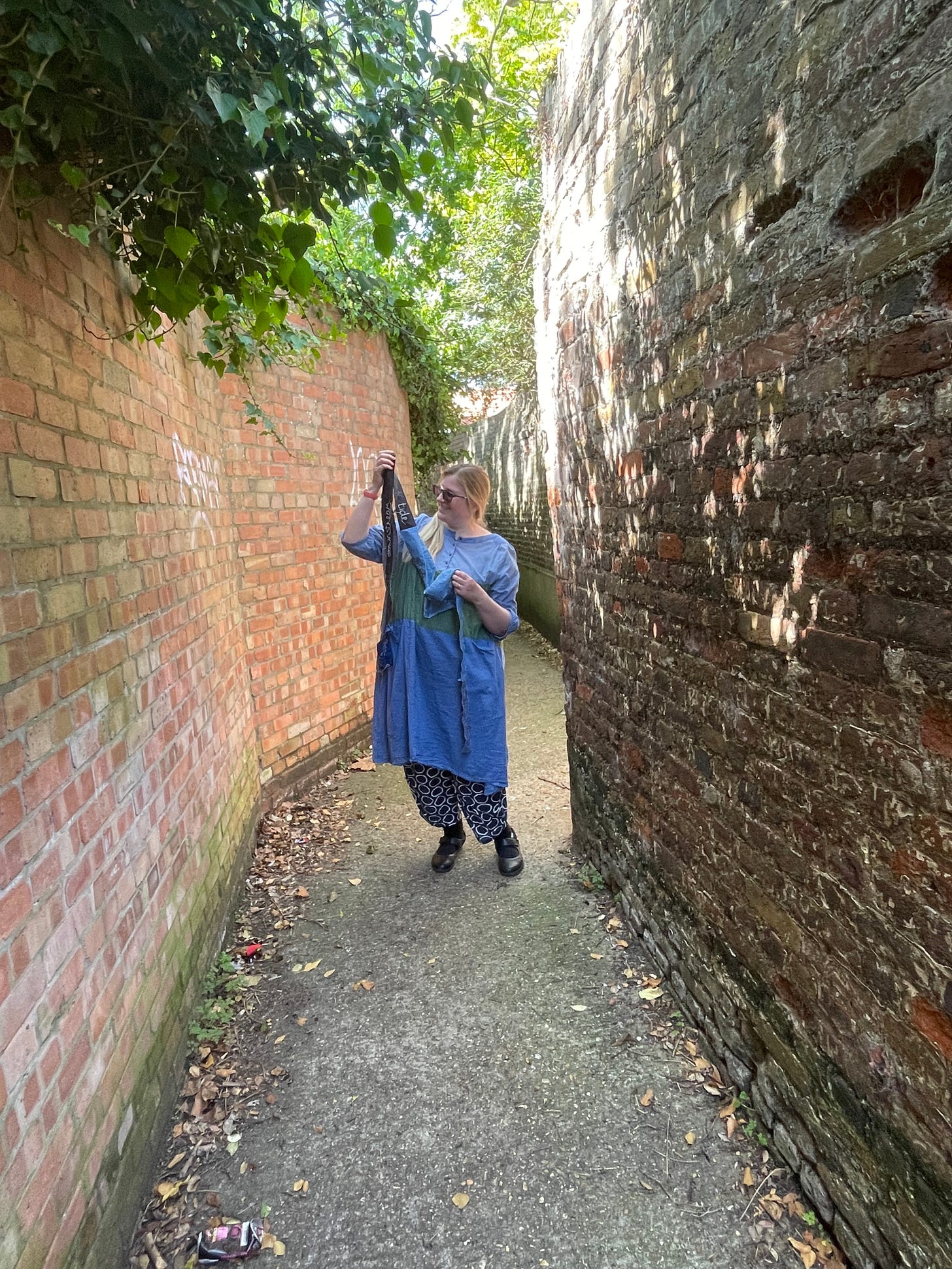
3. Only one man’s opinion
I mentioned Wyatt’s poems about the May executions in a previous post. Interestingly, Cromwell finds artistic fault with them:
He thinks, these lines lack form and force. Some of them are more Tom Truth than Tom Wyatt. And yet they present to him those corpses, promiscuous, heaped upon a cart: their pale English limbs intermingled, their heads in sodden bags.
I suspect Cromwell’s aesthetic critique is a proxy for his own revulsion at having these dead men resurrected in verse. And Cromwell is looking for something else in these verses: absolution. In an Afterword for The Mirror and the Light, Mantel writes:
I must have read this whole poem twenty times before the force of these lines struck me: the writer is blaming the executed Norris, no one else, for his destruction. Does this mean the writer thinks Norris was guilty of adultery with the queen? Or is he to blame only for some rash statement, by which he is ‘undone’? But then, if the word in the manuscript is not ‘guide’, but ‘guile’, is the implication that Norris has been tricked into a confession? When you read Wyatt you should read him out loud, and bear in mind that the meaning is changed by the punctuation – and that the punctuation was inserted later, by an editor. Pause in a different place, and a different range of meanings opens up.
Nevertheless, Cromwell sounds angry with Wyatt. He says, ‘It’s only one man’s opinion.’ Later, he recalls using those words to Dick Purser when he asked whether the queen was guilty:
‘You want my opinion?’ He had passed his hand over his face. ‘You see, Dick, it is why we have courts of law, and judges, and juries … to protect us from the tyranny of one man’s opinion.’
Law absolves Cromwell, and we see again why Mantel’s alternative title for the trilogy could be A Dialogue between Law and Conscience (see footnote above).

4. Man of Sorrows
When Cromwell meets Jane, she has Anne’s Book of Hours open at the Man of Sorrows.
He takes the book from her. Christ is kneeling, his flesh gory from head to heels, each bleeding cut fine as a wire. The picture is set within a border of peapods and ripe strawberries: the king has written some lines in French. 'Lady Rochford has kindly translated it for me,' Jane says. 'I am yours, Henry R, forever. And then she replied to him.'
The Man of Sorrows depicts Christ after his crucifixion. It is an emotionally powerful devotional image intended for prayer and contemplation. Henry’s love note feels incongruous and almost blasphemous, but he probably meant it to be received piously by the woman who had made him wait so long. Jane Rochford must have relished her ‘kindness’ in translating it for ‘pasty Jane’. And the queen herself would have conflicting thoughts about that little word, ‘forever.’
This picture adds to the week’s sombre theme of suffering and contemplation. And if Henry is comparing himself to Christ, this scene echoes Cromwell’s blasphemy when he tells Chapuys he will have his wine on a sponge, ‘when I’m nailed above London.’
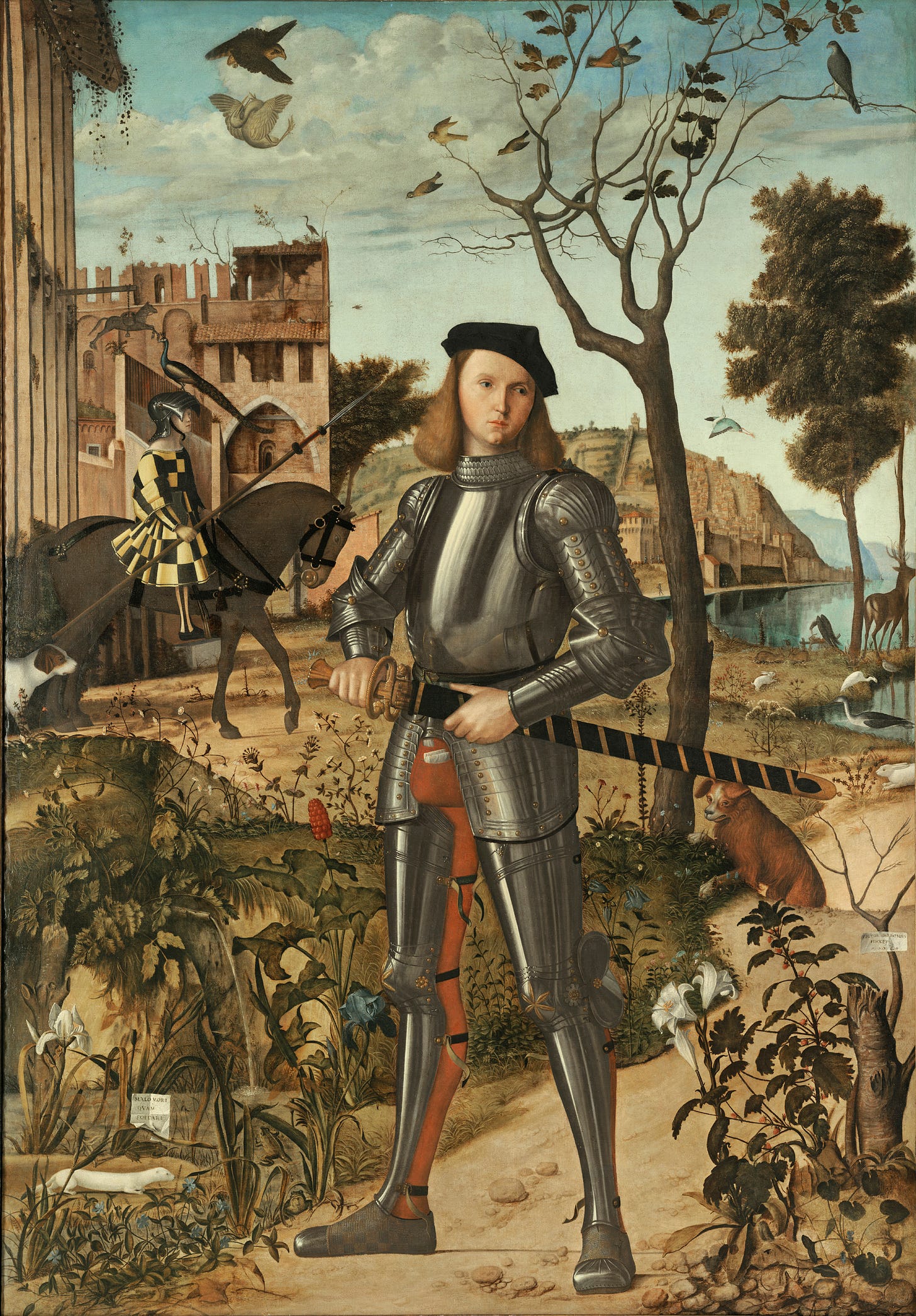
5. Music for murder
‘Light a fire, the dew is falling. later he may ask for music …’
What do you listen to after you have signed the death warrant for your childhood friend? Hilary Mantel gives us a sample from Henry VIII’s execution playlist. All Italian composers, including uplifting melodies for lute, the athletic galliard dance and the more serene basse-dance. In his mind’s eye, Cromwell sees the five condemned men dancing as they will have done on previous occasions.
Here is a flavour of the music:
6. New engines
'Great families are subject to reversals. For a decade, they climb; then their enemies hurl them down; then they overthrow their enemies, and lead them in a Roman triumph, in chains. It used to be that, if you and your kind stuck doggedly to the wheel of fortune, you would rise as far as you had fallen. But then comes a fellow like me, and knocks you clean off the wheel. Be advised, I can do it.'
One of my favourite encounters this week is between Cromwell and Margaret Pole, Countess of Salisbury. They trade threats and exchange warnings. She is the matriarch of an ancient family, the last living link to a medieval world governed by feudal hierarchies and the ‘wheel of fortune’. He represents the new order and new times: the rise of mercantilism and the middling sort. The wheel is broken, and ‘new engines drive them.’ Margaret Pole responds:
‘But I shall counsel you, my lord, and I beg you to hear me out. You speak of new times and new engines. These engines may rust before you have wheeled them to the fight. Do not join battle with the noble families of England. You have lost before you ride out. Who are you? You are one man. Who follows you? Only carrion crows, bone-pickers. Do not stop moving, or they will eat you alive.’
It is a chilling exchange. Both interlocutors will be killed by their king. Everything they say to each other is going to come true. So be advised.
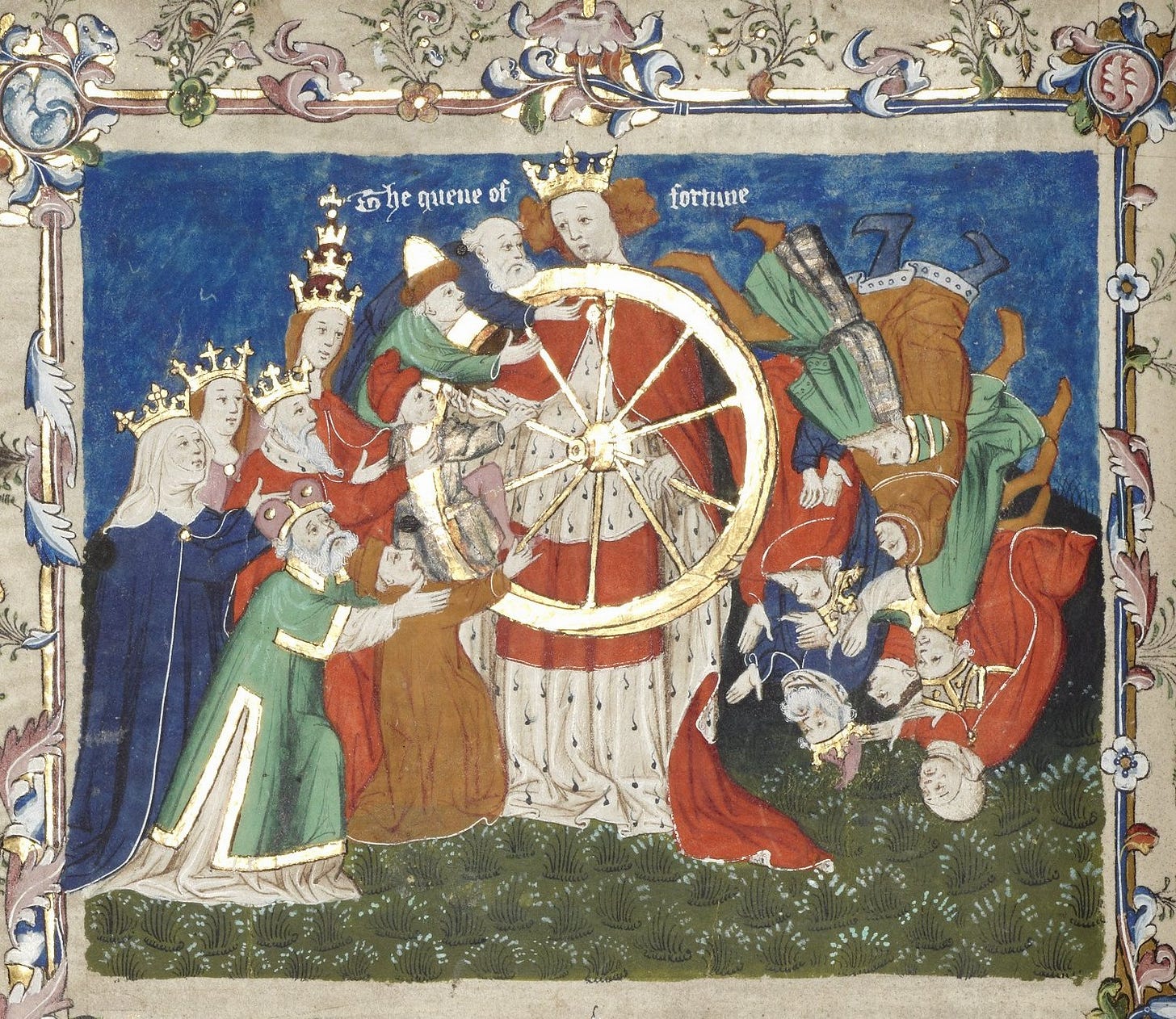
7. Music for mourning
In Kent, there is a poignant scene where Henry summons Cromwell at dawn. ‘The room smells sweetly, of lavender and pooled beeswax.’ Outside, a boy sings a refrain from “You and I and Amyas”, a song associated with the 1522 pageant where Henry first met Anne. Henry wistfully duets with the boy, mournfully announcing himself as ‘Desire, your man.’ Here is a version of that song:
Thomas Cranmer, Archbishop of Canterbury, has given Henry consoling verses that refer to the death of King David’s newborn son as punishment for his adultery with Bathsheba, the wife of Uriah. In Henry’s current state of mind, all three of his children were born out of wedlock and in sin. If God is punishing him with the death of Richmond, it is not entirely clear for what. He used to blame his unlawful marriages. Now he blames the Poles:
‘I have told you before this, how Pole’s family laid a curse, after young Warwick was beheaded. My brother Arthur died at fifteen. My son Richmond, at seventeen.
If there is a curse on Tudor sons, it will outlive Henry VIII. His son and successor, Jane’s child Edward VI, will die in 1553, aged only fifteen.
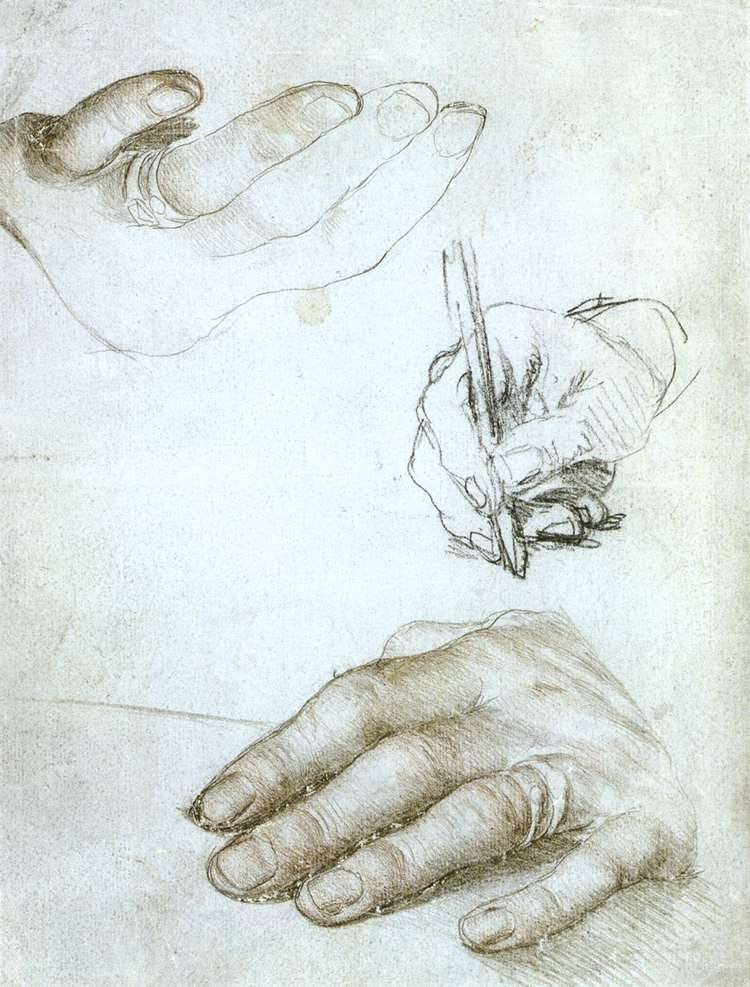
8. Goodbye, Erasmus
The king tells him, 'Erasmus is dead.' 'So I hear.' 'I saw him first when he came to Eltham when I was a child. You would have seen him at Thomas More's house, no doubt.' The great man's eyes passed over him, over Thomas Cromwell: saw him and forgot him. He says, 'He civilised us.' The king says, 'Then he died with work to do.'
On 12 July 1536, the Dutch scholar and theologian Desiderius Erasmus, aged sixty-nine, departed this world. His final words were, ‘Lord, put an end to it. Dear God.’
Erasmus was one of the greatest thinkers of his day, a leading light of humanism and Renaissance thought. He inspired religious reformers, but he remained within the Catholic Church, believing it must be reformed from within. He was a voice for dialogue and tolerance in a world increasingly polarised by religion. His death feels a portent for the killing to come.
Cromwell remembers the great man not seeing him at Thomas More’s house. He doesn’t seem too aggrieved. He enjoys being invisible. But it seems both the king and his secretary know that Erasmus’ project failed. The civilised are dead. Only monsters live here now.
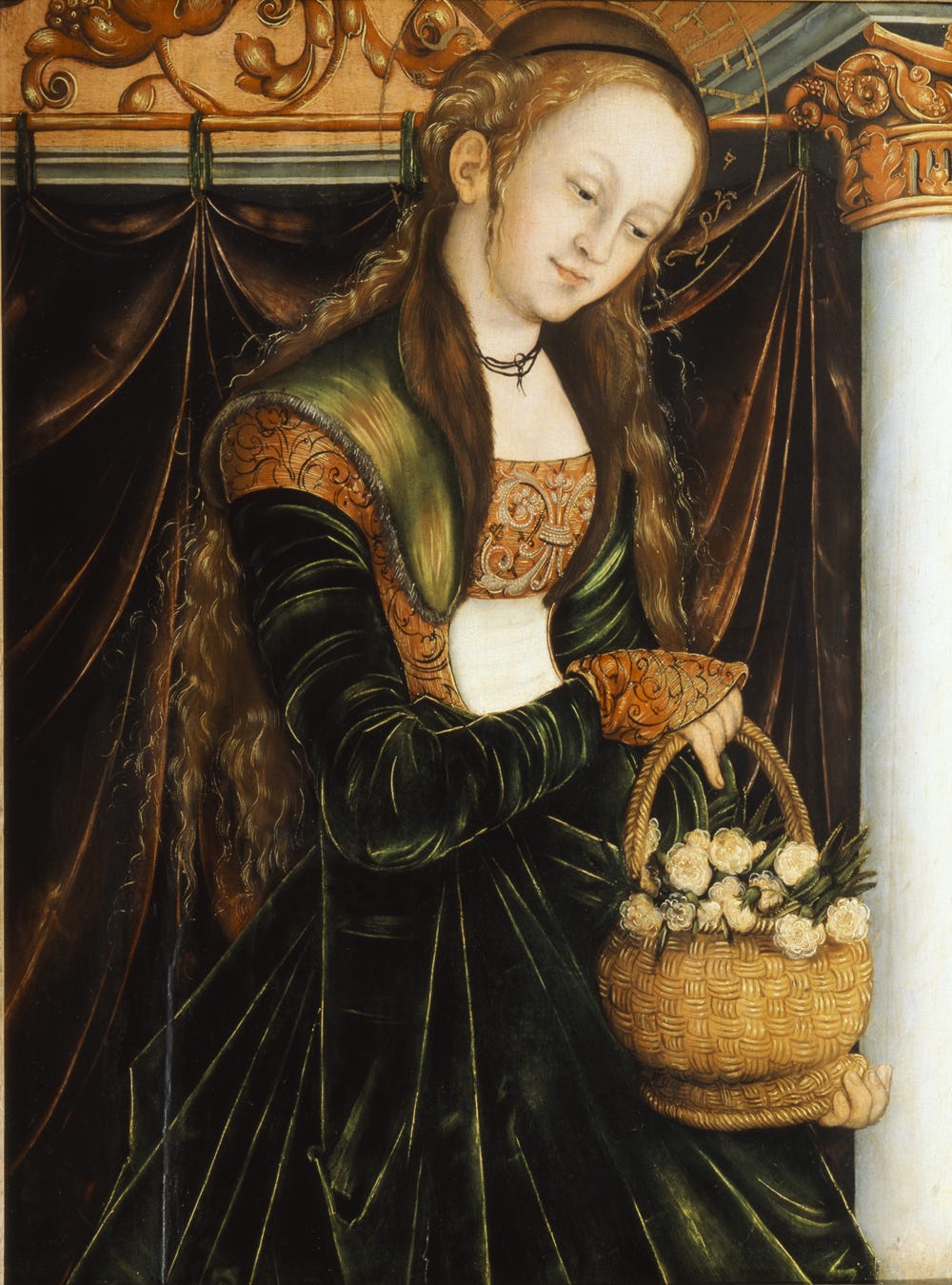
Quote of the week: Don’t look back
I will end this post where I began. If you want to know what The Mirror and the Light is about, you could do worse than pin this quote on your wall. Note the repetition of ‘sliding’ and ‘slipping’ as the past loses its secure, safe solidity. Note the fading light and the presence of some terrible cat-like creature coming for us in the night. Cromwell’s past has grown monstrous and hungry, and it is now a beast stalking him, haunting him, hunting him to his end:
Don't look back, he had told the king: yet he too is guilty of retrospection as the light fades, in that hour in winter or summer before they bring in the candles, when earth and sky melt, when the fluttering heart of the bird on the bough calms and slows, and the night-walking animals stir and stretch and rouse, and the eyes of cats shine in the dark, when colour bleeds from sleeve and gown into the darkening air; when the page grows dim and letter forms elide and slip into other conformations, so that as the page is turned the old story slides from sight and a strange and slippery confluence of ink begins to flow. You look back into your past and say, is that story mine; this land? Is that flitting figure mine, that shape easing itself through alleys, evader of the curfew, fugitive from the day? Is that my life, or my neighbour's conflated with mine, or a life I have dreamed and prayed for; is this my essence, twisting into a taper's flame, or have I slipped the limits of myself – slipping into eternity, like honey from a spoon? Have I dreamt myself, undone myself, have I forgotten too well; must I apply to Bishop Stephen, who will tell me how transgression follows me, assures me that my sins seek me out; even as I slide into sleep, my past pads after me, paws on the flagstones, pit-pat: water in a basin of alabaster, cool in the heat of the Florentine afternoon.
Next week
Thank you for reading and joining me on this slow read of the Cromwell trilogy. Next week, we are reading ‘Augmentation, London, Autumn 1536’ This runs from page 255 to 277 in the Fourth Estate paperback edition. It begins: ‘The dead man comes out of the Well with Two Buckets’ It ends: ‘and when they die, they go to Heaven.’
And before I go, a quick reminder that this book group is entirely funded by its readers. So, if you have enjoyed this post and found it helpful, please consider a paid subscription to access the bonus episodes on The Haunting of Wolf Hall and start your own discussion threads in the chat area.
Alternatively, you can show your support with a one-off contribution by leaving me a tip over on Stripe. These always make my day and remind me that this project is worthwhile and finding a good home.
Until next week, I am your guide,
Master Simon Haisell




These last few reads have left me feeling claustrophobic. I keep seeing the pieces moving closer and closer to Cromwell. This statement. That look. It's all building piece by piece. A masterclass in tension.
The writing here is just unbelievable. The dance between now and then, memory and reality. And that conversation about the wheel. Genius.
This is only the second time I have read this volume, and it’s only now, reading so slowly, with Simon’s help, that I realise why it took Hilary so long to write it. It takes time to craft such words, and to place them, and to set the pace for them.